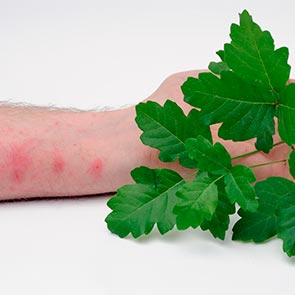Poison Oak Rash Treatment in Crystal Springs, FL

Have you visited a wooded or swampy area in the western United States or southwestern Canada? Is your skin red, itching, burning, or blistering? You may be experiencing dermatitis, a skin reaction caused by poison oak exposure. While some are more sensitive to poison oak than others, about 80% of people will have some type of negative skin reaction when exposed to it.
Extended exposure to poison oak or inhaling smoke from burning poison oak can be very dangerous to your health. If you have intense pain, blistering, or itching, or if you think you've inhaled poison oak smoke, get medical attention right away.
While mild poison oak dermatitis usually isn't a serious health concern, seeking medical attention is a good idea. To speak with a poison oak specialist today in Crystal Springs, call (813) 536-3212 or contact Evolution online.
What are the symptoms of poison oak exposure?
Symptoms occur when your exposed skin touches poison oak. The leaves, stems, and branches of poison oak can cause the rash. These poison oak dermatitis symptoms are usually easily recognized:
- red skin rash appearing in streaks or patches
- itchiness and swelling
- blisters or bumps
About 80% of people experience varying degrees of poison oak sensitivity. While poison oak rashes aren't contagious, other people can be affected if they come into contact with you or any object carrying traces of urushiol.
Severe allergic reactions are rare, but they can occur if you've had long exposure to poison oak or if a large part of your body is affected. Dermatitis can also be more dangerous and cause more severe symptoms when it affects your mucous membranes - the skin of your eyes, nose, mouth, and genitals.
If your exposure is extensive or your mucous membranes are affected, or if you have symptoms of a severe allergic reaction such as difficulty breathing, severe swelling, fluid leaking from the blisters, or intense and intolerable itching, seek medical attention right away.
Poison oak smoke is a serious health hazard. Urushiol in poison oak smoke can affect your lungs, nose, lips, and mouth. It's vital to know that inhaling poison oak smoke can be fatal, so avoiding burning poison oak is crucial for protecting your health.
Call your medical provider or seek emergency medical care immediately if you've recently been exposed to wood smoke and experience the following symptoms:
- difficulty breathing
- rash, hives, burning, or intense itching inside your nose or mouth, or on your lips
- fever
What causes poison oak rashes?
Poison oak, poison sumac , and poison ivy all contain an irritating oil known as urushiol. When your bare skin comes into contact with urushiol, your body initiates an immune response that results in an allergic reaction. While brief exposure to urushiol doesn't usually cause a reaction, prolonged exposure causes an immune response resulting in dermatitis.
Poison oak exposure typically occurs during spring, summer, and early autumn, when you're more likely to be outside.
How is poison oak rash diagnosed?
Brief poison oak exposure usually doesn't require seeking medical care. However, if your rash is extensive or is causing extreme pain, itching, or other severe symptoms, you should seek medical attention.
Diagnosis poison oak dermatitis is usually fast and easy because the rash pattern is common and simple to identify. Let your medical provider know that you'd visited a wooded, grassy, or swampy area prior to the rash occurring for accurate diagnosis. If you haven't been to a wooded, grassy, or swampy area recently, your medical provider may recommend allergy tests to diagnose the underlying cause of your dermatitis.
How is poison oak rash treated?
Treatment focuses on reducing allergic reaction until your body takes care of it. In most cases, mild to moderate poison oak dermatitis can be managed at home with:
- cool showers or baths (never very hot or very cold; don't rub skin with a towel after)
- calamine lotion
- topical anesthetics like benzocaine: can cause dizziness, breathing problems, and fast heart rate
- oral antihistamines like Benadryl: studies show these have been linked to dementia risk1
- over-the-counter painkillers like ibuprofen or acetaminophen (never give aspirin or aspirin-based painkillers to people under the age of 18)
- gel from inner flesh of aloe vera leaves or lotion to hydrate and heal (chilling gel before applying helps relieve pain and itching)
- bathing in cool water with oatmeal, apple cider vinegar, or baking soda
- oatmeal and baking soda pastes applied directly to the infected area
- organic goldenseal to reduce the chance of infection
- black tea: dab on affected skin, but never apply to your skin while it's hot
- avoiding scratching or picking blisters
- resting
Never apply antihistamine creams to your skin unless your medical provider specifically advises it. Doing so can aggravate your dermatitis and worsen your symptoms. Always discuss home remedies with your medical provider before using them.
Most poison oak rashes are annoying but not serious, lasting no more than 3-10 days. Your symptoms may continue up to 30 days if you're experiencing an intense reaction, but severe dermatitis is rare.
If you do have a serious case of dermatitis, your medical provider may prescribe steroid medications that will reduce inflammation. If your rash is infected from your scratching, you may be given antibiotics.
To avoid spreading urushiol and giving others dermatitis, wash your clothes immediately and shower to ensure you've removed all traces of the offending oil. Avoid taking a bath, as it may spread the urushiol to other parts of your body. Clean your shoes, socks, and outdoor gear right away, as it may be carrying traces of urushiol. Remember to wear gloves when handling these items, as touching the urushiol may cause you further dermatitis.
Reserve Your Appointment Now
Poison oak exposure can cause a skin irritation that's annoying but rarely dangerous. However, poison oak can cause severe allergic reactions in some people and inhaling its smoke can cause life-threatening symptoms. If you have a severe dermatitis reaction or think you've inhaled poison oak smoke, call your medical provider or seek emergency medical care immediately.
To speak with a poison oak specialist today in Crystal Springs, call (813) 536-3212 or contact Evolution online.
Sources:
1. Shelly L. Gray, PharmD, MS1 Melissa L. Anderson, MS2; Sascha Dublin, MD, PhD2,3. Cumulative Use of Strong Anticholinergics and Incident Dementia A Prospective Cohort Study JAMA Intern Med. 2015; 175(3):401-407. doi:10.1001/jamainternmed.2014.7663
Evolution
Address
4691 Van Dyke RoadLutz, FL 33558
(813) 536-3212
www.evolution4health.com
Hours
Mon:
10:00 am - 4:00 pm
Tue:
10:00 am - 4:00 pm
Wed:
10:00 am - 5:00 pm
Thu:
10:00 am - 6:00 pm
Fri:
10:00 am - 3:00 pm
Sat:
Closed
Sun:
Closed

